Presidents 31-33
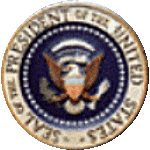

Herbert Hoover
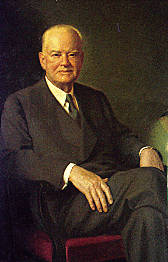
No man ever came to the White House who seemed more prepared than Herbert
Clark Hoover. After a successful career in business, he had won fame and
praise for his work with relief agencies and as Warren Harding's Commerce
Secretary. But in spite of all his intelligence and dedication, Hoover was not
able to lead the United States out of the Great Depression.
Herbert Hoover was born on August 10, 1874, in West Branch, Iowa. Orphaned at
an early age, Hoover worked and studied hard to be admitted to Stanford
University. There he studied geology and mining engineering. As a mining
engineer, he worked all around the world, and in 1908 he formed his own firm.
Soon he was worth over $4 million.
During World War I, Hoover left business in order to head various relief
organizations that sent food and clothing to millions in war-torn France and
Belgium. Warren Harding made him Commerce Secretary in 1921. Hoover proved to
be a hard-working Cabinet member who used progressive regulations to protect
the consumer and shorten the working day. When President Coolidge decided not
to seek reelection in 1928, Hoover seized the nomination. A booming economy
and prejudice against Democrat Alfred Smith, a Roman Catholic, helped Hoover
win the election.
Hoover had been President only a few months when the stock market crashed.
This was followed by the economic catastrophe that became known as the Great
Depression. Millions lost their jobs. By 1933, the United States unemployment
rate had reached 25 percent.
Hoover did not believe that the federal government should give direct aid to
the poor and unemployed. Instead, he created the Reconstruction Finance
Corporation, which loaned $2 billion to businesses, banks, and state
governments. But it was not enough, and many people grew angry that Hoover did
not do more. People began calling the shantytowns of the homeless "Hoovervilles."
Hoover ran for reelection in 1932, but was defeated by Democrat Franklin
Roosevelt. After the Second World War, President Truman appointed Hoover to
head the Famine Emergency Committee. And both Presidents Truman and Eisenhower
asked Hoover to head commissions to figure out ways to make government more
efficient. Hoover served his nation well in these positions, and they helped
him regain some of the reputation he had lost by being the wrong man in the
White House at the wrong time.
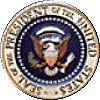
Franklin D. Roosevelt
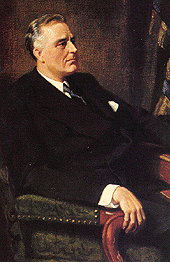
With the exception of Abraham Lincoln, no President faced greater challenges
than did Franklin D. Roosevelt. In meeting the challenges of the Great
Depression and the Second World War, Roosevelt transformed and enlarged the
presidency and the federal government as no other President had.
Franklin Delano Roosevelt was born into a wealthy and privileged family on
January 30, 1882, in Hyde Park, New York. He attended Harvard University, and
went on to become a lawyer. Entering politics as a Democrat, he won election
as a New York state senator when he was just 28 years old. Woodrow Wilson
appointed Roosevelt Assistant Secretary of the navy during World War I.
Roosevelt resigned this position to become the Democratic vice presidential
candidate in 1920. However, Republicans Warren Harding and Calvin Coolidge
soundly defeated the team of James Cox and Franklin Roosevelt.
In 1921, while vacationing at Campobello Island, New Brunswick, Roosevelt was
stricken with polio and his legs were paralyzed. He would never walk again
without the use of heavy leg braces and canes. But with the encouragement of
his wife, Eleanor, Roosevelt began a struggle to rebuild his life and career.
The fight against polio strengthened his character and deepened his
sympathies.
In 1928, Roosevelt was elected governor of New York. As governor, Roosevelt
began broadcasting "fireside chats" over the radio, a practice he
would continue as President. In 1932, the Democrats chose Roosevelt as their
presidential candidate. With the nation in the middle of a depression, the
public needed hope. The optimistic Roosevelt promised a "New Deal"
for the American people. He defeated President Herbert Hoover by a landslide.
Roosevelt kept his promise for swift action. He assembled a team of economic
experts, nicknamed the "Brain Trust," to create new policies and
programs. Roosevelt sent dozens of bills to Congress, most of which quickly
passed. A host of new government programs were created to regulate banks, hire
the unemployed, stop unfair business practices, stabilize crop prices, protect
unions, and build public works. These programs greatly increased the role of
the federal government in the lives of all citizens. Although the economy
recovered slowly during the 1930s, Roosevelt's determination and optimism gave
people hope, and he easily won reelection in 1936. But foreign affairs became
increasingly important during Roosevelt's second term.
The Second World War began in Europe on September 1, 1939, when Hitler's
Germany invaded Poland. Roosevelt pledged to maintain the neutrality of the
United States, yet he supported aid to Great Britain and France. After France
fell to the Germans, Roosevelt agreed to give Great Britain 50 destroyers. The
Lend Lease Act of 1941 that followed provided Great Britain, the Soviet Union,
and other allies with over $50 billion worth of arms and supplies.
Roosevelt broke tradition by running for a third term in 1940. Although some
Americans felt that no man should have so much power for so long, Roosevelt
easily won reelection.
With the Japanese attack on Pearl Harbor on December 7, 1941, the United
States entered the war in earnest. Roosevelt joined forces with Britain's
Winston Churchill and Joseph Stalin, the Soviet dictator. The "Big
Three" worked on a strategy for defeating the Axis powers (Germany,
Japan, and Italy). They decided to try to defeat the Germans first. By late
1944, the end of the war in Europe was in sight. Roosevelt's health was
deteriorating, but he was able to conceal this from the public and won a
fourth term as President.
In February, 1945, a weary Roosevelt attended a "Big Three"
conference at Yalta in the Soviet Union to discuss plans for the postwar
world. It was his last major conference. On April 12, 1945, Roosevelt died of
a stroke while resting at Warm Springs, Georgia. Millions of Americans --
including many who could not remember any other President -- mourned the man
who had seen them through the hardest years of the twentieth century.

Harry S. Truman
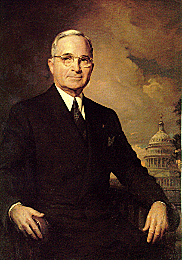
On April 12, 1945, President Franklin D. Roosevelt died and Vice President
Harry Truman was told he had to take over a country in the midst of war.
"I felt like the moon, the stars, and all the planets had fallen on
me," Truman said the next day. The modest, plain-spoken Truman had never
wanted to be President, but once in the office he was determined to do his
best.
Harry Truman was born on May 8, 1884 in Lamar, Missouri. He had wanted to
attend West Point, but his eyesight was too poor. Since his family did not
have the money to send him to college, he held a variety of odd jobs until the
United States entered World War I. Truman's Missouri National Guard Unit
became part of the regular army during the war, and he was soon commanding an
artillery battery in France. When some of his men fled during their first
battle, Truman rallied them.
After the war, Truman entered Missouri politics as a Democrat. Although he
benefited from his friendship with Thomas Pendergast, a political boss, he
steered clear of the corruption that surrounded Pendergast. He rose steadily
until he was elected to the Senate in 1935. Truman was an energetic senator
who favored progressive legislation. He strongly supported Franklin
Roosevelt's New Deal. During the Second World War, he gained fame as chairman
of a committee that exposed billions of wasted dollars in defense spending.
President Roosevelt asked Truman to be his running mate in the 1944 election.
Truman knew that Roosevelt was in ill health and was frightened of the
possibility of becoming President. But he accepted out of loyalty to Roosevelt
and the Democratic party. He was Vice President fewer than three months before
he became the new President.
Many people thought that Truman would be a caretaker President. However, he
quickly demonstrated that he had a mind of his own. He decided to use the
atomic bomb on the Japanese cities of Hiroshima and Nagasaki, thus bringing
the war with Japan to a swift conclusion. When the Soviet Union began
installing communist puppet governments throughout eastern Europe, Truman
offered American aid to any nation fighting communism. This "Truman
Doctrine" became the cornerstone of the new American foreign policy of
stopping the spread of communism.
By 1948, Truman had discovered that he liked being President, and he ran for
reelection. Pollsters and pundits predicted he would lose to Republican Thomas
Dewey. But Truman embarked on a 30,000 mile whistle-stop campaign across the
United States. He delivered more than 300 speeches attacking the
Republican-controlled Congress that he claimed was attempting to undo the New
Deal. People liked Truman's direct speaking style. He defeated Dewey by a
narrow margin.
During his second term, Truman presided over the Marshall Plan, which spent
$13 billion to rebuild war-ravaged Europe. This was a foreign policy triumph
that earned Secretary of State George Marshall a Nobel Peace Prize.
In 1950, South Korea was invaded by communist North Korea. Truman asked for
and received a United Nations mandate to repel the invaders. General Douglas
MacArthur commanded the United Nations forces, which drove the North Koreans
back across the border at the 38th parallel. When the Chinese Red Army joined
the North Koreans in a counterattack, MacArthur called for all-out war with
China. Truman opposed the request, as he feared an escalating war, which might
possibly involve the Soviet Union. When MacArthur criticized his decision,
Truman fired him. Although as commander in chief Truman clearly had the
authority to do so, firing the popular general cost the President much
support.
After his second term, Truman retired to Independence, Missouri. He continued
to be an elder statesmen of the Democratic party until his death on December
26, 1972.

All images of Presidents are courtesy of whitehouse.gov
Information taken from Software titled "American Heritage The History of
the United States for Young People.
The copyright belongs to: Forbes
Inc. and Byron Preiss Multimedia Company. Thank You!

Washington, Adams, Jefferson
Madison, Monroe, Adams
Jackson, Van Buren, Harrison
Tyler, Polk, Taylor
Fillmore, Pierce, Buchanan
Lincoln, Johnson, Grant
Hayes, Garfield, Arthur
Cleveland, Harrison, Cleveland
McKinley, T. Roosevelt, Taft
Wilson, Harding, Coolidge
Hoover, F. Roosevelt, Truman
Eisenhower, Kennedy, Johnson
Nixon, Ford, Carter
Reagan, Bush, Clinton
Bush, ????, ????
|

|
All graphics and
pages are copyright © 1997 - 2008 Pages 4 Ever
(except where noted). Do not take, copy, steal, plagiarize or use in any
way, shape or format without the express written permission of Pages
4 Ever.
Some backgrounds and graphics made from clipart acquired from ArtToday, Boxed Art,
friends, my own imagination, and/or
graphic CD collections that I have purchased. If you find anything on this site
that you have copyright to, and can prove it, please let me know and I will
gladly either remove it or place a link back to you, whichever you prefer.
If you should find any broken links, please drop us a line and let us know the
exact URL the broken link is on. Thank you.
|

|
![]()





